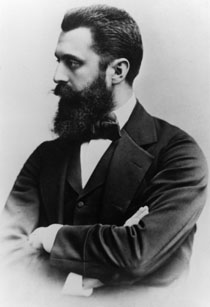| Theodor Herzl  Born: 2-May-1860 Born: 2-May-1860
Birthplace: Budapest, Hungary
Died: 3-Jul-1904
Location of death: Edlach, Austria
Cause of death: Pneumonia
Remains: Buried, Mount Herzl, Jerusalem, Israel
Gender: Male
Religion: Jewish
Race or Ethnicity: White
Sexual orientation: Straight
Occupation: Activist, Playwright Nationality: Austria
Executive summary: Lead Zionist Founder of modern Zionist movement, born in Budapest on the 2nd of May 1860, and died at Edlach on the 3rd of July 1904. The greater part of his career was associated with Vienna, where he acquired high repute as a literary journalist. He was also a dramatist, and apart from his prominence as a Jewish Nationalist would have found a niche in the temple of fame.
All his other claims to renown, however, sink into insignificance when compared with his work as the reviver of Jewish hopes for a restoration to political autonomy. Herzl was stirred by sympathy for the misery of Jews under persecution, but he was even more powerfully moved by the difficulties experienced under conditions of assimilation. Modern anti-Semitism, he felt, was both like and unlike the medieval. The old physical attacks on the Jews continued in Russia, but there was added the reluctance of several national groups in Europe to admit the Jews to social equality. Herzl believed that the humanitarian hopes which inspired men at the end of the 18th and during the larger part of the 19th centuries had failed. The walls of the ghettos had been cast down, but the Jews could find no entry into the comity of nations. The new nationalism of 1848 did not deprive the Jews of political rights, but it denied them both the amenities of friendly intercourse and the opportunity of distinction in the university, the army and the professions.
Many Jews questioned this diagnosis, and refused to see in the new anti-Semitism which spread over Europe in 1881 any more than a temporary reaction against the cosmopolitanism of the French Revolution. In 1896 Herzl published his famous pamphlet Der Judenstaat. Holding that the only alternatives for the Jews were complete merging by intermarriage or self-preservation by a national reunion, he boldly advocated the second course. He did not at first insist on Palestine as the new Jewish home, nor did he attach himself to religious sentiment. The expectation of a Messianic restoration to the Holy Land has always been strong, if often latent, in the Jewisn consciousness. But Herzl approached the subject entirely on its secular side, and his solution was economic and political rather than sentimental. He was a strong advocate for the complete separation of Church and State.
His proposals undoubtedly roused an extraordinary enthusiasm, and though he almost completely failed to win to his cause the classes, he rallied the masses with sensational success. He unexpectedly gained the accession of many Jews by race who were indifferent to the religious aspect of Judaism, but he quite failed to convince the leaders of Jewish thought, who from first to last remained (with such conspicuous exceptions as Nordau and Zangwill) deaf to his pleading. The orthodox were at first cool because they had always dreamed of a nationalism inspired by messianic ideals, while the liberals had long come to dissociate those universalistic ideals from all national limitations. Herzl, however, succeeded in assembling several congresses at Basel (beginning in 1897), and at these congresses were enacted remarkable scenes of enthusiasm for the cause and devotion to its leader.
At all these assemblies the same ideal was formulated: "the establishing for the Jewish people a publicly and legally assured home in Palestine." Herzl's personal charm was irresistible. Among his political opponents he had some close personal friends. His sincerity, his eloquence, his tact, his devotion, his power, were recognized on all hands. He spent his whole strength in the furtherance of his ideas. Diplomatic interviews, exhausting journeys, impressive mass meetings, brilliant literary propaganda -- all these methods were employed by him to the utmost limit of self-denial. In 1901 he was received by the sultan; the pope and many European statesmen gave him audiences.
The British government was ready to grant land for an autonomous settlement in East Africa. This last scheme was fatal to Herzl's peace of mind. Even as a temporary measure, the choice of an extra-Palestinian site for the Jewish state was bitterly opposed by many Zionists; others (with whom Herzl appears to have sympathized) thought that as Palestine was, at all events momentarily, inaccessible,, it was expedient to form a settlment elsewhere. Herzl's health had been failing and he did not long survive the initiation of the somewhat embittered "territorial" controversy. He died in the summer of 1904, amid the consternation of supporters and the deep grief of opponents of his Zionistic alms.
Herzl was beyond question the most influential Jewish personality of the 19th century. He had no profound insight into the problem of Judaism, and there was no lasting validity in his view that the problem -- the thousands of years' old mystery -- could be solved by a retrogression to local nationality. But he brought home to Jews the perils that confronted them; he compelled many a
"semi-detached" son of Israel to rejoin the camp; he forced the "assimilationists" to realize their position and to define it; his scheme gave a new impulse to "Jewish culture", including the popularization of Hebrew as a living speech; and he effectively roused Jews all the world over to an earnest and vital interest in their present and their future.
Wife: Julie Naschauer (m. 1889)
Law School: LLD, University of Vienna (1884)
World Zionist Organization Founder (1897)
Dreyfus Affair Reporter for Austrian newspaper
Audience with the Pope Pope Pius X (26-Jan-1904)
Exhumed 1949
Requires Flash 7+ and Javascript.
Do you know something we don't?
Submit a correction or make a comment about this profile
Copyright ©2019 Soylent Communications
|